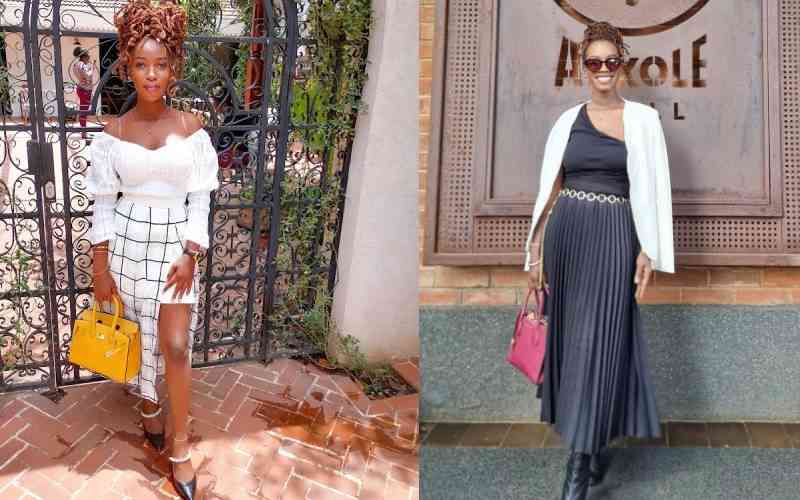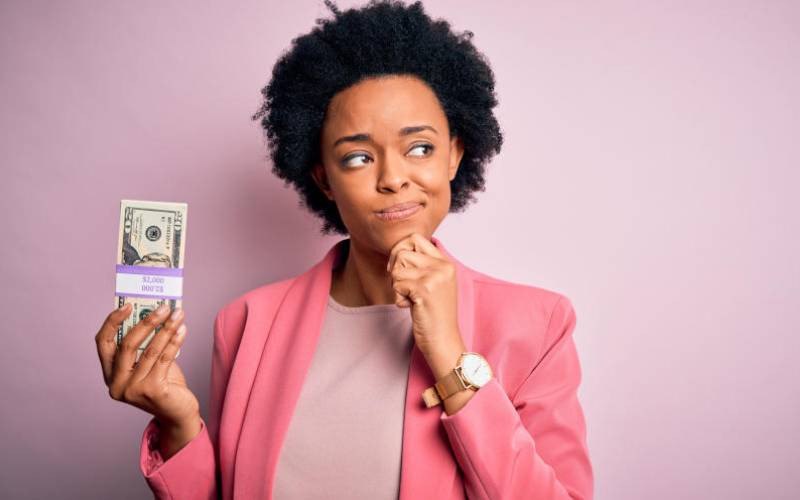
When Kelly Sitambasi was first diagnosed with cancer, she was just a child preparing for her KCPE exams. "I remember trying to go to school but ending up back home because I was too unwell to stay in class," she recalls. "I started chemotherapy while still preparing for my exams and I was terrified."
That terror was deepened not only by the uncertainty of her illness but also by the loneliness. "I told my classmates and my best friend, who is still my friend to this day and I just remember feeling so scared. I didn't know what that meant for me."
But it was her return to treatment in 2017 that truly reshaped her life. Admitted to a public hospital, she found herself face to face with a broken healthcare system.
"This is the first time I ever saw someone lose their last breath," she says. "I remember crying so much to my doctor, asking what if I was next?"
That fear became a spark. "It was no longer just about beating this, but about making sure no woman had to go through what I did, especially in silence."
From that experience, two powerful platforms were born: The Kenyan Feminine Goddess, an online space for healing and dialogue and the Goddess Care Initiative, a grassroots project focused on health aid and education for underserved women.
Her battle with cancer was marked by more than just medical treatment; it was an emotional war. "The fear came in waves," she says. "Especially after witnessing someone pass away in the ward for the first time. Then it happened again. I just went numb."
Disappointment followed when her exam results came out lower than hoped. "I was angry at myself. But I realised I couldn't blame myself for something I was going through at such a young age. That acceptance was the beginning of my healing."
- Self care: The path to being a better parent
- How to deal with sibling rivalry
- How to introduce children to budget literacy
- Modern fatherhood: Rise of the present dad
Keep Reading
By 2020, during the stillness of the pandemic lockdown, she created the Kenyan Feminine Goddess platform. The name "Feminine Goddess" came from a late-night conversation with a friend. "We were talking about healing, and in that moment, she helped me choose a name that felt right." For her, it symbolised reclaiming power and honouring scars. "Those scars are part of me, but they don't define me."
The platform is a celebration of feminine resilience, representing the courage to own one's softness, to heal loudly, and to stand firmly in one's femininity in a world that often misunderstands it.
Her community visits revealed just how neglected rural women in Kenya truly are. "Our first project was in Mafuto, Lugari. The women lacked access to basic healthcare. The nearest hospital was nearly 30 minutes away and that's after getting to Luandeti, which is another hurdle."
More than just a lack of access, it was a lack of information. "It's like the system has forgotten them. They don't know about health and wellness because no one has ever taught them."
Through the Goddess Care Initiative, she began to deliver care packages - sanitary towels, diapers, food, clothing - to women in remote villages. "It may seem small, but for many of these women, it makes a world of difference."
Meanwhile, the Kenyan Feminine Goddess operates online to raise awareness and build digital sisterhood. "It's about shifting mindsets, creating community and empowering women with tools and confidence."
One story still haunts her. "We once sent a package to a woman in one of the villages. She was struggling with more than just poverty; it was hunger and being completely forgotten." They stayed in touch, but due to limited funding, the support couldn't continue. "Not long after, she passed away."
It was a painful reminder of what is at stake. "That moment changed how I saw everything. This work isn't just about advocacy, it's about life and death for some people."
Her work aligns directly with the United Nations' Sustainable Development Goal 3: Good Health and Well-being. "If we don't have good health, it's really hard to navigate through life. I've lived through a broken healthcare system."
Through outreach programs, partnerships with doctors, and grassroots health education, the Goddess Care Initiative supports real, measurable outcomes. "We also talk about self-care and mental health because health isn't just physical; it's emotional and psychological too."
To create systemic change, Kelly believes the government must act first. "Local leaders need to prioritise health at the grassroots level, not just during campaigns." Even simple solutions like small community health clinics could make a huge difference.
She emphasises the urgent need for health education. "Many women don't even know the warning signs of illness or when to seek help. They don't know much about mental health either."
Kelly has also created spaces like the Nairobi friendship speed dating event for women. "Having a sisterhood to share your thoughts and experiences is healing."
Leading these initiatives has taught her that leadership is not about being the loudest. "It's about showing up, especially when no one is watching." Her anonymous platform creates space for honest, judgment-free conversation.
 The Standard Group Plc is a multi-media organization with investments in media
platforms spanning newspaper print
operations, television, radio broadcasting, digital and online services. The
Standard Group is recognized as a
leading multi-media house in Kenya with a key influence in matters of national
and international interest.
The Standard Group Plc is a multi-media organization with investments in media
platforms spanning newspaper print
operations, television, radio broadcasting, digital and online services. The
Standard Group is recognized as a
leading multi-media house in Kenya with a key influence in matters of national
and international interest.

